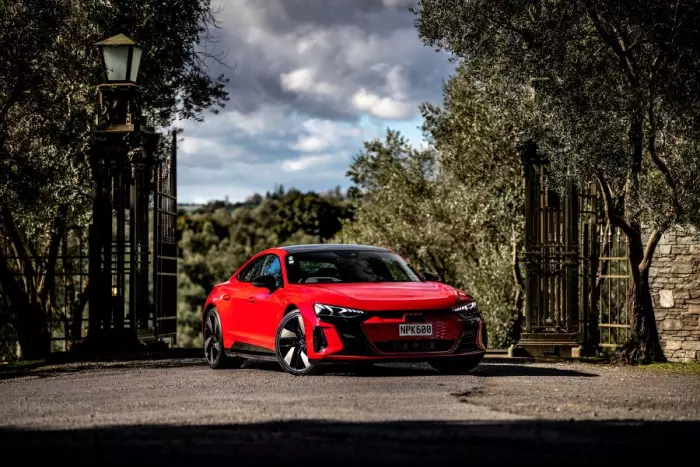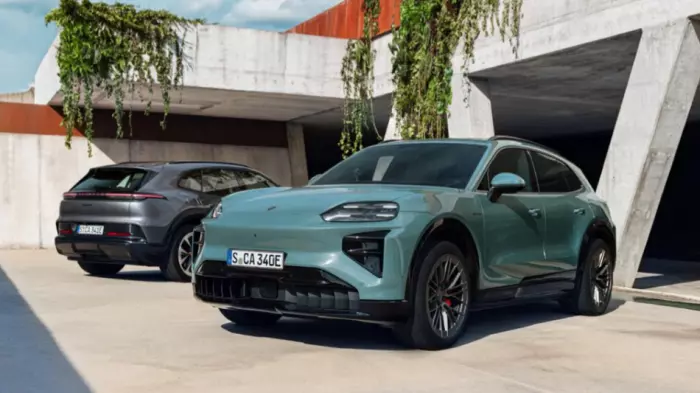The Audi RS e-tron GT retails for $273,500 and it’s worth every cent.
It’s a monster. A great long and low monster of a grand-touring EV that wraps its arms around you and says, “Let’s go really fast.”
The acceleration is not just quick, it is cinematic in its scope and ambition.
This is a car that’ll do 0-100km/h in 3.3 seconds, and zero to divorce in about the same time if you repeat that feat too often without appropriate warning.
As the first electric car developed by Audi Sport, it delivers up to 475kW of power and 830Nm of torque. Its top speed is 250km/h, but I think that must be conservative. It is based on the same platform as the VW Group stablemate the Porsche Taycan, but Audi has made it its own, promoting it as the German firm’s new “signature” car.
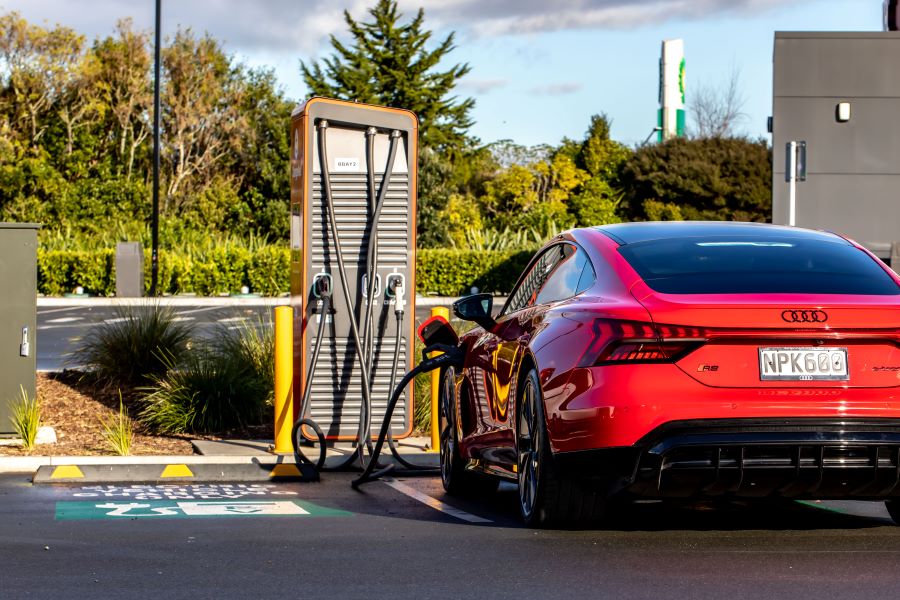 The RS e-tron GT provides about 487km travel per recharge.
The RS e-tron GT provides about 487km travel per recharge.I reckon I touched maybe 10% of its overall capabilities. I did not even come close to pushing this vehicle anywhere near the edges of its capabilities. This is a car that lives for an autobahn or a closed circuit.
For example, a rear spoiler raises automatically at 180km/h. Apparently.
When I went for a walk at Tāwharanui Regional Park north of Auckland, I came back to a crowd of guys standing around the car. I dropped in to see my brother in Pt Chevalier and when I returned, a woman raced out of her front gate to see who owned it and to take a closer look. I presumed she was expecting Mike Hosking or some such.
Somehow, the car’s understated light silver colour made it even more appealing.
It’s a vehicle that turns heads for a few reasons, the first of which is that it looks super cool and futuristic, but also is huge. It measures 4.99m long. By comparison, the new Land Rover Defender is 4.58m long. Four-wheel steering, however, means its turning circle is surprisingly good.
At low speeds the rear wheels turn in slightly the opposite direction to the run wheels to add agility. At high speed, all wheels turn in the same direction to increase vehicle stability.
Audi also says the entire production process is net carbon neutral. If you can power it from an off-grid solar set-up (like I do when at home), it’s a car that does little harm to the planet.
Even the RS version’s lights are futuristic. It uses lasers rather than LEDs, which doubles the range of high beam and is perfectly, totally safe.
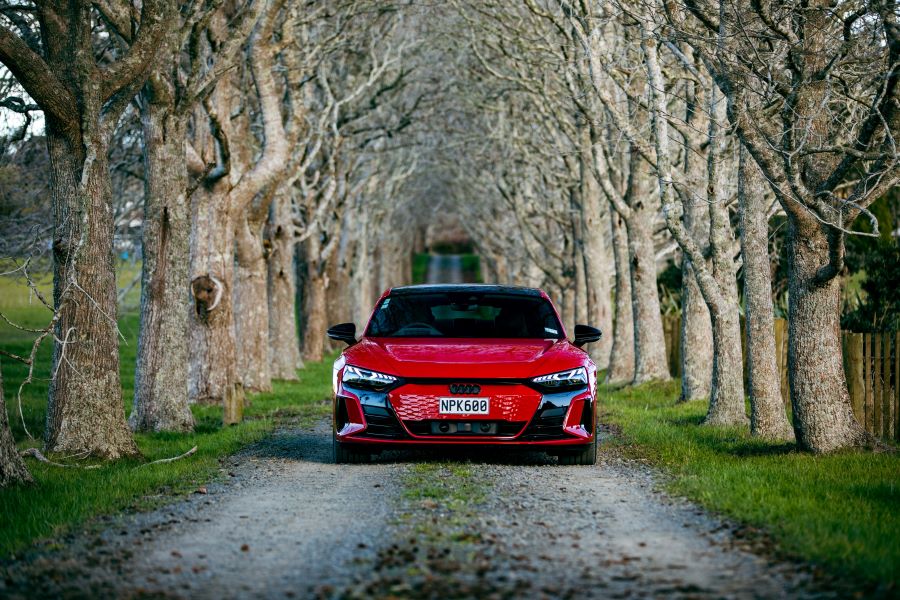 At $273,500 the RS e-tron GT doesn't qualify for the clean-car rebate.
At $273,500 the RS e-tron GT doesn't qualify for the clean-car rebate.The e-tron GT’s size does have drawbacks. It feels heavy, particularly when I brake. Weighing 2860kg, it is hardly light. I don’t mean to fat-shame, but those batteries are heavy. Also, it’s not that it didn’t brake right each time, but you could feel the weight of the vehicle pushing forward.
The 93kWh battery (on an 800-volt system) provides about 487km of travel per recharge. I plugged it in at a supermarket while I did 20 minutes of shopping and added 150km of charge. Given the ever-increasing range of electric vehicles nowadays, range anxiety is becoming a thing of the past.
Regenerative battery recharge strength is handled by paddles on the steering wheel. These are the same paddles used for changing gear in a fossil-fuel vehicle and that always seems a bit odd.
Although it is slightly longer than an interisland ferry, the passenger-side leg room seems stingy, requiring my 1.88m wife to manoeuvre in and out, unable to stretch her legs. Given there is no engine up front, this seems like a poor design choice.
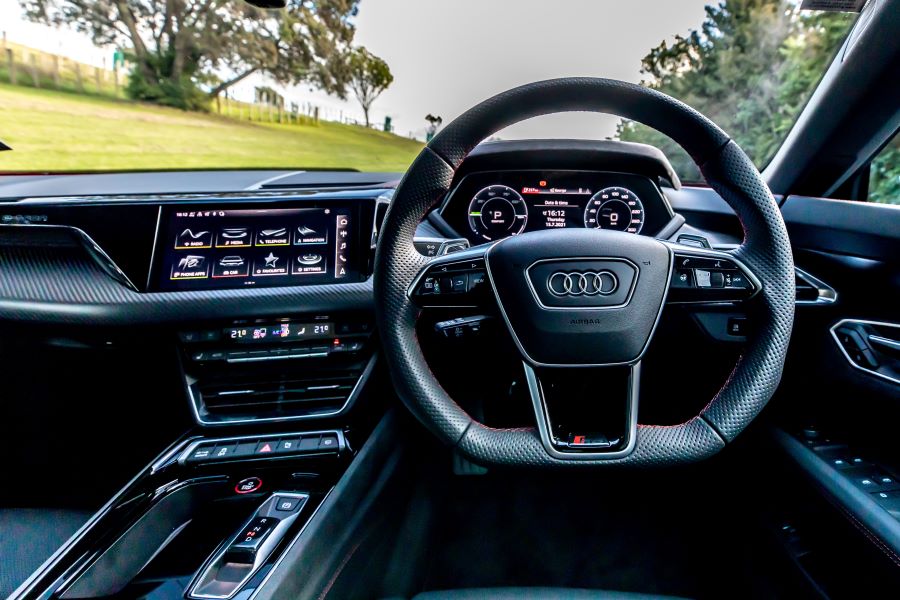 Audi has designed fake engine noises for this all-electric car.
Audi has designed fake engine noises for this all-electric car.Auckland’s covid status during the Delta lockdown meant it was not possible to take the car for a long run on the bendy roads of Northland, but the country driving I did manage revealed tight cornering and a surprisingly comfortable ride.
The toughest critic in the family, the 13-year-old, loved it – after overcoming her reluctance to go anywhere with her dad.
At $273,500 the RS e-tron GT does not qualify for the clean-car rebate, but Audi will contribute $1750 towards an at-home EV charger and a key fob for ChargeNet.
Its slightly less impressive non-RS sibling sells for $194,500 and takes nearly an extra second to get to 100km/h. It also does not qualify for the rebate. So far, Audi has delivered 29 e-tron GTs and 23 of the RS version. There is no wait list because each order is a bespoke build.
I often get asked which car is my favourite. I’ve never had a clear answer, though the BMW 330e and Alfa Romeo Giulia Veloce Carbon are standard replies. Until now. The answer will henceforth be the Audi RS e-tron GT.
It is a spectacular, sophisticated sports car with the good manners to be your daily commuter car.
Audi NZ general manager Dean Sheed says this car “sets a benchmark for all Audis to come”. I agree.


